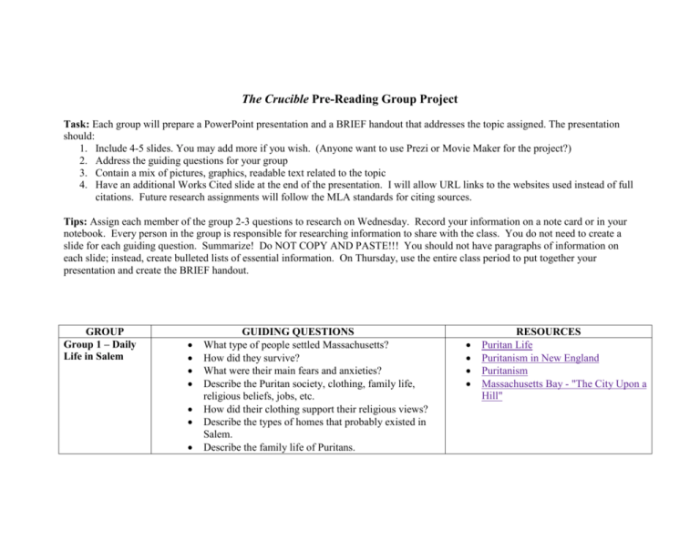Crucible pre reading think like a puritan – Embark on an intellectual journey with “Crucible Pre-Reading: Think Like a Puritan.” This exploration delves into the enigmatic world of Puritan beliefs, unveiling the profound impact they had on society and shaping the events depicted in Arthur Miller’s iconic play, “The Crucible.”
Through a comprehensive analysis of Puritan values, historical context, and the play’s characters, we will unravel the complexities of this fascinating era, gaining a deeper understanding of its enduring legacy.
Puritan Beliefs and Values: Crucible Pre Reading Think Like A Puritan

Puritanism emerged as a religious movement within the Protestant Reformation. Its adherents, known as Puritans, held a distinctive set of beliefs that shaped their attitudes towards life, society, and the world.
Central to Puritan theology was the doctrine of predestination, which asserted that God had predetermined the eternal fate of every individual. This belief instilled a sense of urgency and self-examination, as Puritans sought to discern their place in God’s plan.
Puritans also emphasized the sovereignty of God, believing that He was the ultimate authority over all aspects of life. This led them to adopt a strict moral code and to seek to establish a society that conformed to God’s laws.
Personal holiness was of paramount importance to Puritans. They believed that individuals had a responsibility to live lives free from sin and to strive for perfection in their thoughts, words, and deeds.
The Crucible as a Reflection of Puritan Society
“The Crucible” by Arthur Miller is a play that provides a vivid portrayal of Puritan society in Salem, Massachusetts, during the infamous witch trials of 1692.
The play reflects the social, religious, and political tensions that were prevalent within Puritan communities. The characters in the play embody Puritan values and beliefs, such as the emphasis on predestination, the importance of personal holiness, and the fear of witchcraft.
Through its characters and events, “The Crucible” sheds light on the complexities and contradictions of Puritan society. It exposes the hypocrisy, fear, and intolerance that could coexist with deep religious conviction.
The Role of Fear and Suspicion in Puritan Communities
Fear and suspicion were pervasive forces in Puritan communities. This was due to a combination of religious beliefs, social pressures, and political instability.
Puritans believed that the world was a battleground between good and evil, and that the devil was constantly seeking to deceive and tempt them. This belief fostered a sense of paranoia and mistrust.
Social pressures also contributed to fear and suspicion. Puritans lived in close-knit communities, where conformity was highly valued. Those who deviated from the norm were often ostracized and accused of being witches or heretics.
Political instability also played a role. Salem, Massachusetts, was a frontier community that was constantly under threat from Native American attacks. This fear of external enemies further heightened the sense of suspicion and fear within the community.
The Impact of The Crucible on Understanding Puritanism, Crucible pre reading think like a puritan
“The Crucible” has had a profound impact on our understanding of Puritanism. The play has helped to illuminate the complexities and contradictions of Puritan beliefs and practices.
By portraying the witch trials as a product of fear, suspicion, and intolerance, “The Crucible” has challenged the idealized view of Puritan society that was once prevalent.
The play continues to resonate with audiences today, as it provides a cautionary tale about the dangers of fear, prejudice, and the abuse of power.
Q&A
What is the significance of predestination in Puritan beliefs?
Predestination was a central tenet of Puritanism, holding that God had predetermined the eternal fate of every individual, regardless of their actions or choices.
How did fear and suspicion shape Puritan communities?
Fear of damnation, social ostracism, and political instability fueled a climate of suspicion and distrust within Puritan communities, leading to accusations of witchcraft and other perceived threats.
In what ways does “The Crucible” reflect the complexities of Puritanism?
“The Crucible” portrays the Salem witch trials as a manifestation of the social, religious, and political tensions within Puritan communities, highlighting the dangers of mass hysteria and the erosion of individual rights.